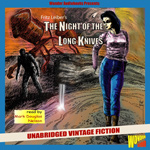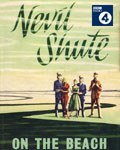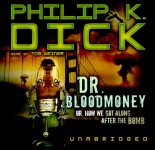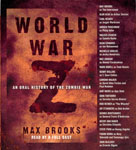
Did you know you can get either of these titles, as well as any other Wonder Audio title for free? Just sign up at Audible.com/WonderAudio
 The Night of the Long Knives
The Night of the Long Knives
By Fritz Leiber; Read by Mark Douglas Nelson
3hr, 37 min.- [UNABRIDGED]
Publisher: Wonder Audio
Published: 2009
A Deathlander’s life is a rough one. Atomic radiation, murder and sex preoccupies the sparse inhabitants of what used to be a great portion of America’s West. Kill or be killed is the law of this sickened land. Multicolored radioactive dusts floats in the atmosphere of this nuclear desert.
When Ray Baker meets a woman on his sojourn, he doesn’t know if he wants to kill her or sleep with her. Ray doesn’t understand his urge to murder. But he feels it like all the other Deathlanders. Just as he knows the girl feels it. Laying down their arsenal of weapons will leave them both vulnerable. The cost of a moment of intimacy may lead to the last moments of their lives. And what to do when the act is over, and both their minds turn back to murder.
 Parasite Planet: The Ham & Pat Stories
Parasite Planet: The Ham & Pat Stories
By Stanley G. Weinbaum; Read by Mark Douglas Nelson
3hr, 47 min.- [UNABRIDGED]
Publisher: Wonder Audio
Published: 2009
The short and meteoric career of Stanley G. Weinbaum produced many instantly hailed classics. None had the breadth of wonder, and adventure with philosophic insight as the trilogy of stories that feature Ham Hammond and Patricia Burlingame.
Parasite Planet begins with Ham Hammond trekking across the surface of Venus. The environment is parasitic, filled with bizarre alien life forms like the lasso throwing Jack Ketch Trees and the doughpots, a mindless omnivorous ball of animate cells that devour all living things in their path. When Ham meets the contentious Patricia Burlingame, they have to march across Venus to safety. It’s not clear what is going to kill them first, Venus’s hostile environment or each other.
In The Lotus Eaters, Ham and Pat are on a special scientific expedition to the dark-side of Venus. They discover a strange warm-blooded plant. The most disconcerting thing about the plant is when it begins speaking English and waxing philosophically.
The Planet of Doubt brings the duo to Uranus on another special scientific expedition. The cloudy shrouded terrain strikes terror into the heart of Ham as tries to find the lost Pat who he hopes is still be alive!
Posted by The Time Traveler of the Time Traveler Show










